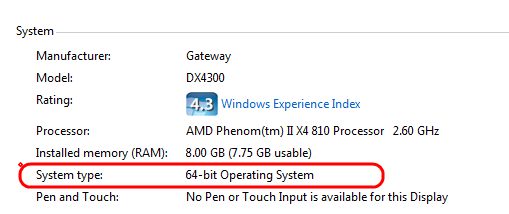
Recent hands-on experience shows that on identical hardware 64-bit systems are often faster than 32-bit systems.
If you found yourself thinking “Will this 32-bit software run on my 64-bit operating system?” or “Will this 64-bit software run on my computer?” or "Should I buy that 64-bit system?" or if you just would like to know more about the difference then read on.
I will try to answer these questions and help you understand the 64-bit and 32-bit concepts of hardware, operating system and applications.
32-bit systems have been part of consumer computing for more than a decade since the time of the Intel Pentium, also known as 80386 architecture or sometimes x86 for short. Most software and operating system code written during this time is 32-bit compatible.
32-bit systems can address up to 4 GB of memory. Some modern applications require more memory to complete their tasks. Progress in chip fabrication technology and demands of high power applications led to the development of 64-bit processors for mainstream computing.
Here is the problem: Most of the software available today is still 32-bit code, but processors have migrated to 64-bit and operating systems are catching up quickly. Eventually even the applications will catch up. Thus we have to cope with many possible combinations of 32 and 64-bits hardware, operating system and applications.
Consider these three factors to be three layers with the processor as the lowest layer and the application as the highest layer.
To run a 64-bit application, you need support from all lower levels (64-bit OS and 64-bit processor).
- To run a 64-bit OS, you need support from its lower level 64-bit processor; it will NOT run on a 32-bit processor.
- A 32-bit OS will run on a 32 or 64-bit processor without any problems because 64-bit processors can emulate a 32-bit processor.
- 32-bit applications will run on any supported combination of OS and processor. In a 64-bit OS this is possible due to software emulation, a feature of 64-bit operating systems.
- Device drivers run parallel to the operating system. Emulation happens only at the operating system level; it is available to the higher layer only, that is the applications. Thus it is not possible to install 32-bit device drivers on a 64-bit machine.
Will a 64-bit CPU run a standard 32-bit program on a 64-bit version of an OS?
Yes it will. 64-bit systems are backward compatible with the 32-bit counterparts (see the warning below).
Will a 64-bit OS run a standard 32-bit application on a 64-bit processor?
Yes it will because of backward compatibility. Please see the warning below.
Can I run Win2K and WinXP on an 64-bit CPU and use old software? Yes, a 32-bit OS like Win-2K and Win-XP will run on 64-bit processors. You can run "old software" on these 32-bit OS and 64-bit processors (see the warning below).
Will my devices (printer, scanner and so on) work when I buy this fancy new 64-bit machine with 64-bit OS?
Here you have to do your homework! Before you buy the fancy new 64-bit computer with 64-bit OS you have to verify that 64-bit drivers are available for all devices you plan on to keep using!
A warning: Many times 64-bit programs may contain bits of 32-bit code; old 32-bit programs can contain 16-bit code. Be aware that 16-bit code will NOT run on a 64-bit OS.
This is one reason why some old 32-bit programs will not work on a 64-bit OS.
Update 2-22-2010:
Personal recommendation when buying a new computer:
For quite a few peripherals that you may have like printers, scanners and so on you may NOT find 64-bit drivers. Do your home work before you buy the fancy-shmanzy new 64-bit system!
Should you not quite know how to do this sort of home work then send me an email to ejheinze_at_gmail_dot_com (or my “normal” email address) with a detailed list of exactly what peripherals you have and a request to find out for you if there are 64-bit drivers available. There will be a small charge for this service because it may be time consuming.
As usual I welcome comments and suggestions right here in the blog.
Thank you in advance.

No comments:
Post a Comment